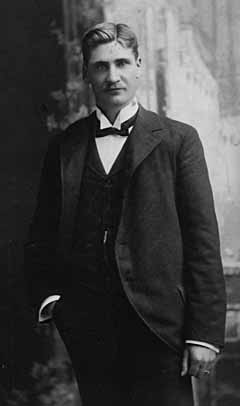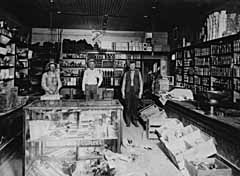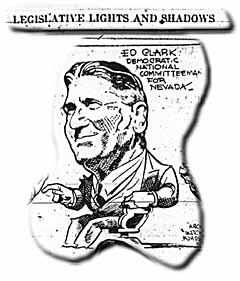Ed Clark




Ed Clark never liked the spotlight, but if you looked behind the scenes, he had his hand on the switches. For 40 years, very little got done in Southern Nevada without Clark’s help.
He seemed always to know what needed to be done and how to do it, then did it before anybody else thought of it. When Las Vegas became the railhead serving rich mines to the north, Clark hauled the freight. When the time came to break away from Lincoln County, Clark did much of the political engineering. He ran Las Vegas’ first bank, its first telephone company, and its first power company. He helped bring Hoover Dam to reality and, perhaps most important, obtained for Nevada a share of the electricity it would generate.
Politically, Clark County became a Democratic stronghold largely because of Ed Clark.
His father was a Democrat before him. Jacob C. Clark was the first sheriff elected in Storey County after Nevada became a state — a surprising result because in the election year 1864 many equated being a Democrat with being a traitor to the Union. Sheriff Clark kept order on the Comstock Lode during two of its liveliest years, 1865 and 1866, but would die soon after the birth of his son in 1871, in San Jose, Calif.
The widow, Julia Clark, that same year moved to the booming silver camp of Pioche. She operated a boarding house for the bachelor miners and educated her own children; Ed would boast later that he was “a graduate of ‘McGuffey’s Third Reader.` ” He grew up helping run his mother’s business and was only 17 when he started his own cattle outfit in the Wilson Creek range of northern Lincoln County.
Pioche was served by no railroad, so Clark went into the freight business, hauling supplies from the Mormon farming communities in western Utah. In the 1890s he went into partnership with C.C. Ronnow of Panaca, and from that day forward the fates of the two families would be intertwined, and both would become part of Southern Nevada history. Clark made his home with the Ronnow family and was called “Uncle Ed” by their children.
Ronnow and Clark operated the Ed W. Clark Forwarding Co., which carried freight from the end of the Union Pacific Railroad, then at Milford, Utah, into the mining country of Southern Nevada.
Clark was elected treasurer of Lincoln County. But he soon found it difficult to please everybody. ….H. Harriman, who controlled the Union Pacific, wanted to extend his railroad westward, while Montana Sen. William Clark wanted to build his own railroad eastward from the port of San Pedro, Calif., to Southern Utah. There was only one good route through Lincoln County, however, and the two interests came to an actual battle over it, with railroad workers slugging it out on a disputed grade with shovels and pick handles. Meanwhile, a war also was waged on the political front, and Ed Clark, though no relation, became aligned with the senator of the same name and for whom the county is named.
Harriman sent Ed Clark a message: This county isn’t big enough for both of us.
In the early 1900s, such a message from Harriman was taken as seriously as one from the Mafia would be in the 1950s. But Ed Clark foiled Harriman, according to folklore, by finagling an appointment as postmaster of Caliente. Even Harriman didn’t dare molest a federal appointee, so Clark stayed in Caliente until he was good and ready to leave.
The truculent tycoons eventually agreed that William Clark would control the railroad in Nevada. Ed Clark became a close associate and ally of his local representatives. While their politics differed, this group all shared one plank: boosting the Southern Nevada economy. By 1905 Clark Forwarding Co. was headquartered in the new town built by the railroad, Las Vegas, hauling freight into mining camps such as Beatty and Rhyolite, to the north, and Eldorado Canyon to the south.
The success of the relatively new communities of southern Lincoln County — Las Vegas and Searchlight — compared to the declining fortunes of Pioche, created tension. Las Vegans and particularly Searchlighters had to travel for days to do business at the courthouse. In summer the trip could be so difficult that some travelers actually died. Argument arose that the county seat should be moved to Las Vegas, but there were many counterarguments. It was just as far from Pioche to Las Vegas as the other way around; and an expensive courthouse already existed in Pioche. Residents in the north end were offended in 1905 when the upstart Las Vegas Age wrested the county printing contract away from the venerable Pioche Record. Then Ed Clark attracted controversy when the Lincoln County public funds, formerly kept in a Salt Lake City bank, found their way to First State Bank of Las Vegas, operated by his friend John S. Park and the railroad interests.
Gradually, a new idea emerged: Let Pioche keep the county seat, and give Las Vegas and Searchlight their own county. A bipartisan organization, the Lincoln County Division Club, was formed to push the idea.
Support was by no means unanimous, even in the south. Searchlighters recognized that a new county seat would end up in Las Vegas, cutting their 233-mile trip to the courthouse by three-fourths, but leaving them with the hardest part — the 55-mile pull from Searchlight to the railroad at Las Vegas. They wondered if the shorter trip would be worth the additional expense. Many business interests opposed division for fear of higher taxes.
Once Treasurer Clark announced his intention to keep Lincoln County deposits in Las Vegas, he attracted the opposition of his old hometowns. In 1908 he lost the office to Henry H. Lee, a member of the pioneer family who founded Panaca.
Most candidates elected that fall, however, supported the Division Club, and in January 1909 it asked the Nevada Legislature to form the new county. As usual, the role Ed Clark played was behind the scenes: Harley E. Harmon, son of one of Clark’s political allies, recalled years later, “The story is told that Clark County was bought by a case of Yellowstone Whiskey purchased with money provided by Clark.”
The new county promptly elected Ed Clark its treasurer. Not long thereafter, Clark also became a director of First State Bank, where the county funds remained. He already had become associated with Park in the Consolidated Power and Telephone Co., the tiny predecessor to the giant corporations that now serve Las Vegas.
His brother, Frank, managed the local cooking-gas company. Frank Clark also was popular and deeply involved in the community, but took his responsibilities too seriously. One morning in 1915, he kissed his wife goodbye, then returned and kissed her again. She asked why he seemed to be in distress. Frank replied, “There is no gas this morning and everyone will blame me for it.” Then he walked to one of the warehouses of the forwarding company, took a .45 revolver kept in a drawer there, and shot himself through the heart.
Ed Clark remained a bachelor all his life. He lived with the Ronnows next to the store at Clark and Main streets. “It was really quite odd that he wasn’t related to us but lived there with my grandparents,” said C.C. Ronnow’s granddaughter, Mary Lee Coleman. “He was a staunch Democrat and my grandfather was a strong Republican. They would each go to the political conventions and they would have heated discussions about politics. Also, he was a Catholic and my grandfather was very active in the Mormon Church, and went on a mission to Denmark even after he was married.
“Ed’s half brother, Fred McFadden, cared for their invalid sister and, after their mother’s death, came to live with the Ronnows, too … It was a nice house for the times but it must have been crowded. There was only one bathroom.” When young Gerald Crowe came to live with them, Clark even shared his bedroom with the boy.
Crowe was the son of Mrs. Ronnow’s sister, who was divorced and died in the Spanish Flu epidemics of World War I.
“There was a hint that if she had lived, he (Clark) would have married Gerald Crowe’s mother,” said Cecile Crowe, Gerald’s widow, who married Gerald in 1932. But if Clark’s bachelorhood resulted from grieving for a lost love, she couldn’t say.
The forwarding company kept changing with the times. The Las Vegas & Tonopah Railroad built northward toward Beatty and gobbled up the freight business. Clark and Ronnow adapted by stressing the mercantile end of their business.
The store attracted the attentions of outlaws as well as solid citizens. In November 1923, a 17-year-old Gerald Crowe accidentally surprised two burglars, who crashed through a glass door in their hasty departure. The Las Vegas Age reported: “Ed W. Clark, eating dinner in the Ronnow home close to the store, heard the crash of the breaking glass and ran out in time to see the … robber sprinting away at a lively rate.” Clark chased him, but, being already more than 50 years of age, was soon outdistanced.
“This is the ‘steenth time the Clark Store has been entered in recent years and Ed Clark is able to keep in good physical condition by chasing the burglars,” said The Age. “With the practice he has had he expects to make a capture in the next chase.”
Less than two weeks later Clark did capture a burglar by surprising him with a double-barreled shotgun and chasing him around the corner, into the grasp of Crowe and C.C. Ronnow’s son, C.L.
Like other prominent Las Vegans, Clark pushed the effort to build a dam on the Colorado River. He served 25 years on the interstate commission that finally persuaded Congress to build it. Harley E. Harmon credited him with originating the idea of the commission, and also with conceiving the Nevada amendments to the enabling legislation. Those gave Nevada and Arizona shares of the water and power provided by the dam. He even proposed a huge pipeline that would have brought Las Vegas enough water for a million people. Shelved by the Bureau of Reclamation because of its great expense, it re-emerged, long after his death, as the Southern Nevada Water Project.
After years of work, enabling legislation for Boulder Dam was signed on Dec. 21, 1928. In Las Vegas, the shop whistle blew, and every business closed except those that sold liquor.
And when the hangovers cleared, folks realized that while Hoover Dam was going to make a lot of people rich, nobody was going to do better than Ed Clark.
Quietly, Clark had placed himself in control of at least three of the town’s more important growth industries.
For years, Clark had been a minor owner in First State Bank, run by cashier John S. Park. Park’s major partner was J. Ross Clark, who had built and run the railroad for his brother and financial backer, William. In 1926 the elderly Park and J. Ross Clark retired, and Ed Clark bought them out and became president. He would hold the position until 1937, when he sold the bank to First National Bank of Nevada.
Thus, within two years of the time he bought the only bank in a one-horse town, that town was marked to become America’s hottest boom town.
Clark continued many conservative policies instituted by Park, who had earned the nickname “Ten Percent John” for the high interest rates he charged on risky loans.
In Joe Midmond’s “First National Bank of Nevada,” a book commissioned by the financial institution, Gerald Crowe related how handily First State weathered the dark days of 1932. On Nov. 1 of that year, trying to save Nevada’s Wingfield Banks from panic withdrawals, the governor declared a bank holiday requiring banks to close their doors. First State Bank complied, but barely.
“The front door was closed but I was stationed at the door and anyone who wanted his money was allowed in,” said Crowe.
Once admitted by Crowe, customers encountered a shotgun-bearing guard, nervously pacing back and forth in front of a counter groaning with the weight of coins and paper money — hundreds of thousands worth. Behind the piled money stood Ed Clark, smiling reassuringly. A sign announced: “This is your money. It is safe.”
Harley E. Harmon, then a youngster who would grow up to run banks of his own, elaborated, “He’d give them money to pay a grocery bill or the rent or anything like that. But if they wanted it all, he wouldn’t let them have it. He said, ‘This bank is sound and you’re not going to break it.’ ”
In 1924, Clark became president of Consolidated Power and Telephone Co. He reorganized into different companies, which have become Sprint of Nevada and Nevada Power Co.
In 1937 his company, then known as Southern Nevada Power, became the first utility to distribute electricity from the newly created dam. This source would satisfy all local electrical needs for 16 years.
A.E. Cahlan, former editor of the Review-Journal, wrote that President Franklin Roosevelt’s visit to dedicate Hoover Dam was originally scheduled to bypass Las Vegas. Clark thought it would be a shame to miss all the attendant free publicity. He enlisted the aid of Nevada’s senior Democratic senator, Key Pittman, who was one of Roosevelt’s allies. With a flurry of telegrams, the two Democrats won the change. Now Roosevelt’s itinerary even included a side trip to Mount Charleston.
His political influence helped bring a war industry to Nevada, the event that started the city of Henderson. He could have been a governor or a senator himself, but turned down nominations more than once.
Clark’s original Las Vegas company evolved into Clark County Mercantile, and one of its division survives today as the venerable Clark County Auto Parts at 505 S. Main St.
Clark died in April 1946, of heart disease and pneumonia, at the age of 74.
Clark left no descendants. Though his estate included much valuable real estate and utility stock, the official report showed only $85,000 cash. He left $10,000 to the Sisters of the Holy Family for their charity work in Clark County, and $10,000 to a niece, Georgia McFadden. Crowe and C.L. Ronnow, the men who helped him bag that burglar back in 1923 and had been trusted associates in later endeavors, got $5,000 each to educate their respective daughters, and J.L. Ronnow got $10,000 to educate his two sons. Clark left $5,000 and real estate to Alice Ronnow, widow of his old partner, C.C. Ronnow.
The stock in his growing utility companies he left to his half brothers, Fred and Clarence McFadden, to two nieces, and a nephew. The rest of his estate was divided among the half brothers, and three former employees: C.S. Wengert, longtime cashier of the bank; S.J. Lawson, who would succeed him as president of the power company; and C.L. Ronnow, its vice president.
All were men he had mentored, and to Clark, all the family he required.












